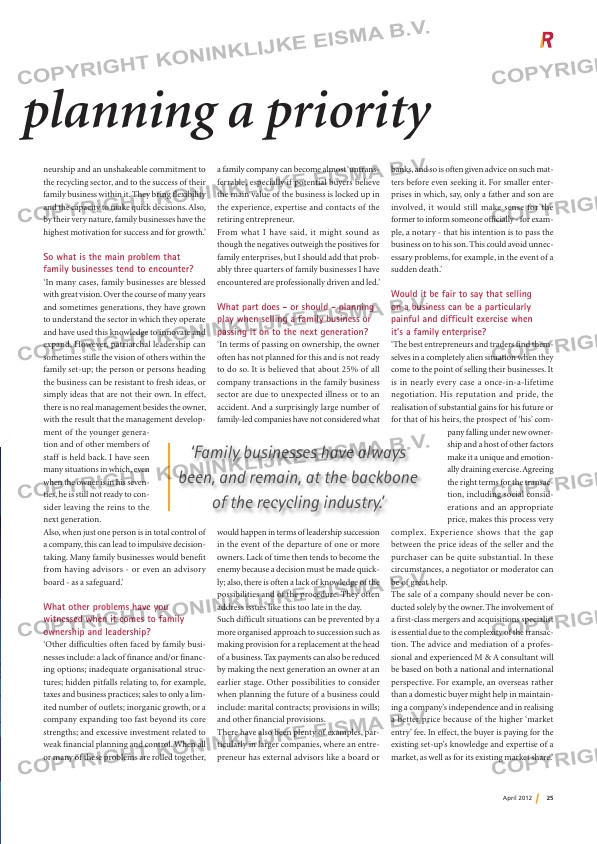Page 25 from: April 2012

25April 2012
neurship and an unshakeable commitment to
the recycling sector, and to the success of their
family business within it. They bring flexibility
and the capacity to make quick decisions. Also,
by their very nature, family businesses have the
highest motivation for success and for growth.’
So what is the main problem that
family businesses tend to encounter?
‘In many cases, family businesses are blessed
with great vision. Over the course of many years
and sometimes generations, they have grown
to understand the sector in which they operate
and have used this knowledge to innovate and
expand. However, patriarchal leadership can
sometimes stifle the vision of others within the
family set-up; the person or persons heading
the business can be resistant to fresh ideas, or
simply ideas that are not their own. In effect,
there is no real management besides the owner,
with the result that the management develop-
ment of the younger genera-
tion and of other members of
staff is held back. I have seen
many situations in which, even
when the owner is in his seven-
ties, he is still not ready to con-
sider leaving the reins to the
next generation.
Also, when just one person is in total control of
a company, this can lead to impulsive decision-
taking. Many family businesses would benefit
from having advisors – or even an advisory
board – as a safeguard.’
What other problems have you
witnessed when it comes to family
ownership and leadership?
‘Other difficulties often faced by family busi-
nesses include: a lack of finance and/or financ-
ing options; inadequate organisational struc-
tures; hidden pitfalls relating to, for example,
taxes and business practices; sales to only a lim-
ited number of outlets; inorganic growth, or a
company expanding too fast beyond its core
strengths; and excessive investment related to
weak financial planning and control. When all
or many of these problems are rolled together,
a family company can become almost ‘untrans-
ferrable’, especially if potential buyers believe
the main value of the business is locked up in
the experience, expertise and contacts of the
retiring entrepreneur.
From what I have said, it might sound as
though the negatives outweigh the positives for
family enterprises, but I should add that prob-
ably three quarters of family businesses I have
encountered are professionally driven and led.’
What part does – or should – planning
play when selling a family business or
passing it on to the next generation?
‘In terms of passing on ownership, the owner
often has not planned for this and is not ready
to do so. It is believed that about 25% of all
company transactions in the family business
sector are due to unexpected illness or to an
accident. And a surprisingly large number of
family-led companies have not considered what
would happen in terms of leadership succession
in the event of the departure of one or more
owners. Lack of time then tends to become the
enemy because a decision must be made quick-
ly; also, there is often a lack of knowledge of the
possibilities and of the procedure. They often
address issues like this too late in the day.
Such difficult situations can be prevented by a
more organised approach to succession such as
making provision for a replacement at the head
of a business. Tax payments can also be reduced
by making the next generation an owner at an
earlier stage. Other possibilities to consider
when planning the future of a business could
include: marital contracts; provisions in wills;
and other financial provisions.
There have also been plenty of examples, par-
ticularly in larger companies, where an entre-
preneur has external advisors like a board or
banks, and so is often given advice on such mat-
ters before even seeking it. For smaller enter-
prises in which, say, only a father and son are
involved, it would still make sense for the
former to inform someone officially – for exam-
ple, a notary – that his intention is to pass the
business on to his son. This could avoid unnec-
essary problems, for example, in the event of a
sudden death.’
Would it be fair to say that selling
on a business can be a particularly
painful and difficult exercise when
it’s a family enterprise?
‘The best entrepreneurs and traders find them-
selves in a completely alien situation when they
come to the point of selling their businesses. It
is in nearly every case a once-in-a-lifetime
negotiation. His reputation and pride, the
realisation of substantial gains for his future or
for that of his heirs, the prospect of ‘his’ com-
pany falling under new owner-
ship and a host of other factors
make it a unique and emotion-
ally draining exercise. Agreeing
the right terms for the transac-
tion, including social consid-
erations and an appropriate
price, makes this process very
complex. Experience shows that the gap
between the price ideas of the seller and the
purchaser can be quite substantial. In these
circumstances, a negotiator or moderator can
be of great help.
The sale of a company should never be con-
ducted solely by the owner. The involvement of
a first-class mergers and acquisitions specialist
is essential due to the complexity of the transac-
tion. The advice and mediation of a profes-
sional and experienced M & A consultant will
be based on both a national and international
perspective. For example, an overseas rather
than a domestic buyer might help in maintain-
ing a company’s independence and in realising
a better price because of the higher ‘market
entry’ fee. In effect, the buyer is paying for the
existing set-up’s knowledge and expertise of a
market, as well as for its existing market share.’
‘Family businesses have always
been, and remain, at the backbone
of the recycling industry.’
Björn Voigt – Make planning a priority
24 am l s ss-2 25 02-04-12 15:4



